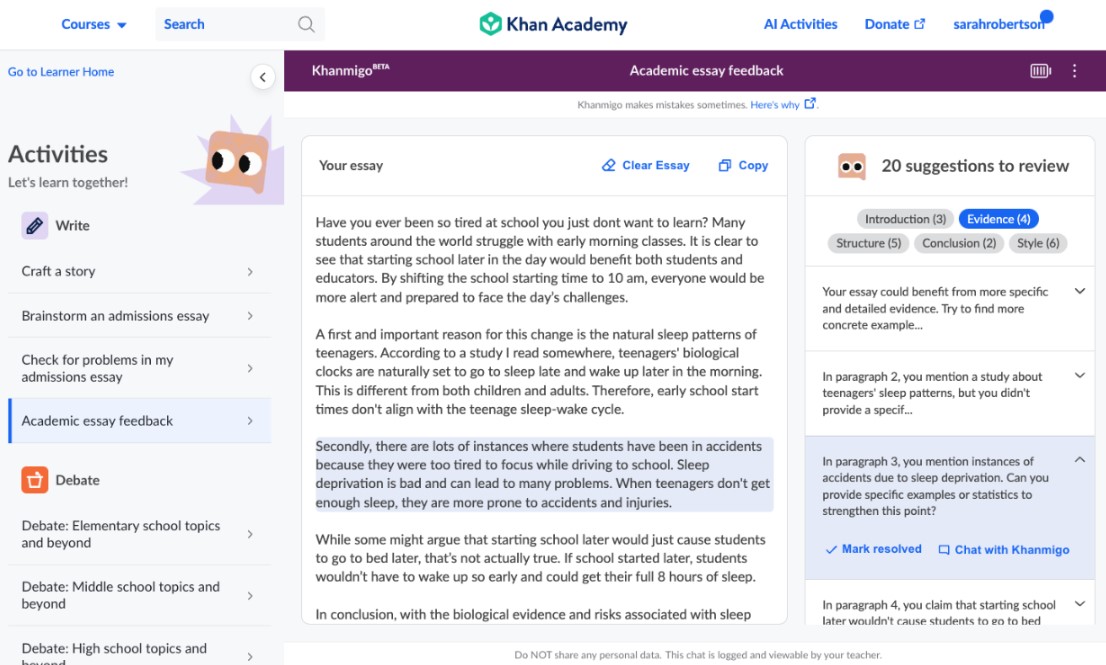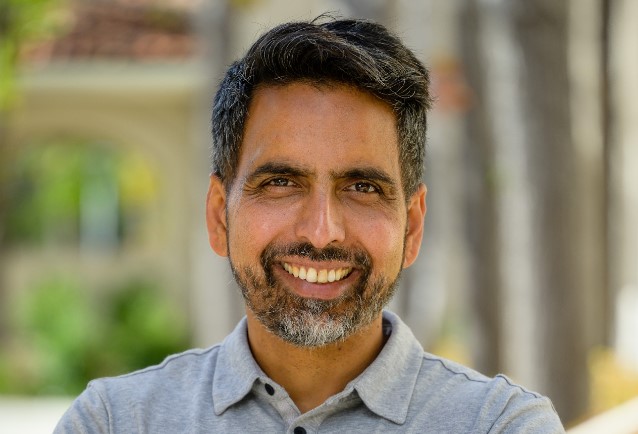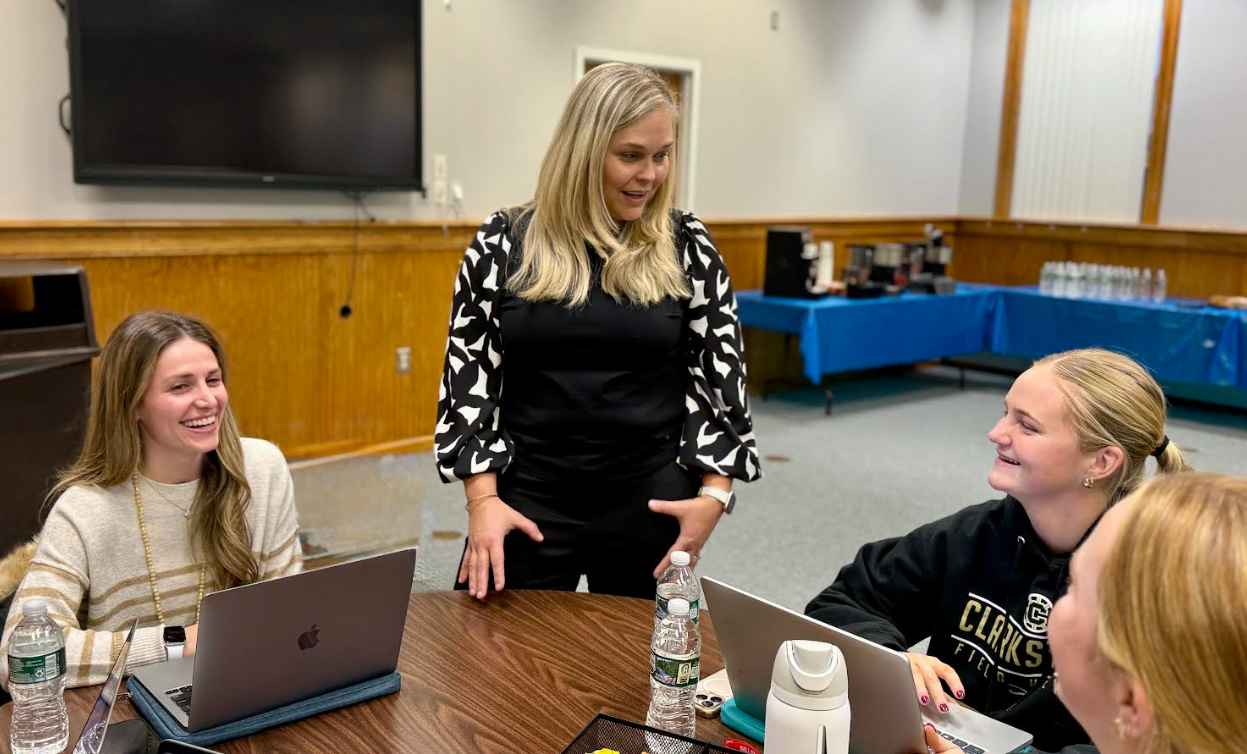Khanmigo’s Academic Essay Feedback Tool Can Help Make Writing Instruction More Accessible, Sal Khan says
Khanmigo’s Academic Essay Feedback tool is designed to guide students through the writing process. As tools like this evolve, they might rewrite writing instruction, Sal Khan says.

Writing is a vital skill for success in modern society but many students don’t get the type of feedback they need, Sal Khan says. “Unlike something like math, which is also very important for someone's success in life, [with writing] it's very hard to get rapid cycle feedback,” he says. “While you're doing it, you tend to be pretty unsupported. Then you submit, you get feedback, oftentimes limited feedback, oftentimes a week or two later.”
Many who succeed at writing do so thanks to unofficial tutoring at home. “Most writing support, I would guess, comes from your family,” says Khan, founder of the free online learning platform Khan Academy. But not all students have family environments that support that, which is why writing success varies so greatly between students.
However, Khan believes generative AI can now help make writing education accessible for all students. In late November, Khanmigo – the GPT-4-powered AI tutor from Khan Academy – leveled up writing assistance for students with the launch of Khanmigo’s Academic Essay Tool. It can provide specific feedback on a student's essay as a whole, offering suggestions on structure, organization, tone, introduction, and conclusions, and how students build and support their arguments. Students can also ask Khanmigo’s Academic Essay Tool clarifying questions.
I recently had a chance to try Khanmigo Academic Essay Tool and speak with Khan about what it currently can do and how it will evolve to better support students in the future.
How Khanmigo’s Academic Essay Writing Works Now

Khanmigo’s Academic Essay Writing tool has an AI chatbot feel that is familiar to many these days, but unlike ChatGPT or Google’s Bard, etc., Khanmigo’s Academic Essay Tool will not write essays for students.
When testing it, I asked for feedback on an early draft of a story I was working on about AI’s impact on assistive technology. Khanmigo complimented the professionalism of my writing (thank you very much!), but suggested a stronger thesis statement in my introduction. News stories and magazine articles don’t necessarily have a thesis statement, so while Khanmigo’s advice wasn’t applicable to my work, the tool did correctly note a thesis was missing. This could certainly be helpful to a young writing student.
I was also impressed by the follow-up question feature. When I asked it to provide specifics on writing a thesis statement, it offered good advice on how I could build an effective thesis. However, impressive as it might be, these features are just the beginning of what Khanmigo’s Academic Essay tool can eventually do.
Tools and ideas to transform education. Sign up below.
How Khanmigo’s Academic Essay Tool Will Evolve
“Within a year, we're gonna have a teacher be able to assign work with the AI and construct a writing activity including a rubric, and assign it through the AI,” Khan says. “The AI doesn't just give feedback, but also helps with the process. ‘Here’s a thesis, let's do some outlining together. Let's find some data to back up your points.’ And then when the AI reports back to the teacher it's not just gonna say, ‘Here's the essay graded.’ It’s going to say, ‘Here's the essay, it took four hours. We had a little trouble coming up with a thesis statement but we eventually got there.’”
The tool will then suggest a grade based on the rubric Khanmigo and the teacher create together, but the ultimate grade will be up to the teacher.
Khanmigo will also potentially help identify cheating. “If a student went to ChatGPT or got their sister to write the essay, and just copy and pasted it in, the AI will tell the teacher, ‘I don't know where this came from. It just showed up, I didn’t work on it with the student, and oh by the way, it's inconsistent with the writing that they've done in class.’”
Khan Academy’s New Focus on Writing
Khan believes generative AI can change the way writing is taught in schools and is working on a new book that touches upon this topic. He also anticipates writing instruction being a bigger part of Khan Academy going forward.
“Our mission is free world-class education for anyone, anywhere,” he says. “If you asked me a year-and-a-half ago, I would have said, ‘We're going to be able to do a lot of those foundational layers of education, Blooms Taxonomy, we're going to handle like the bottom two-thirds really well.' And then the top one-third, which I would include writing, I would have said, ‘We're not gonna be able to do in our lifetimes.’ And that's now different."
Khan adds, "A lot of folks associate Khan Academy with math and science. I think in the coming year we're going to be as strong, or stronger, in reading and writing."
Erik Ofgang is a Tech & Learning contributor. A journalist, author and educator, his work has appeared in The New York Times, the Washington Post, the Smithsonian, The Atlantic, and Associated Press. He currently teaches at Western Connecticut State University’s MFA program. While a staff writer at Connecticut Magazine he won a Society of Professional Journalism Award for his education reporting. He is interested in how humans learn and how technology can make that more effective.

